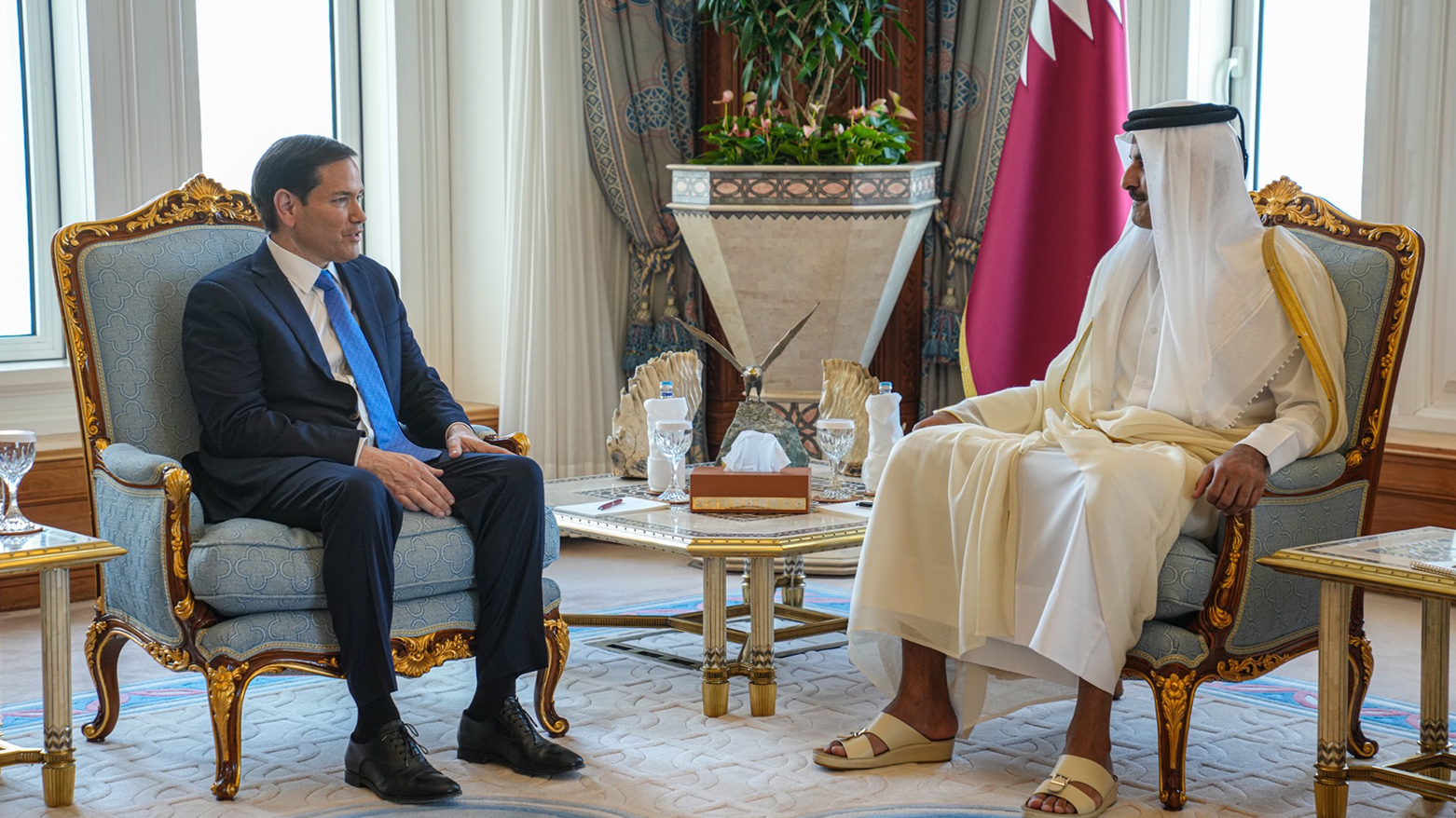Rubio Meets Qatari Leaders in Doha Amid Fallout from Israeli Strike
U.S. Secretary of State Marco Rubio met Qatar’s Amir and PM in Doha, reaffirming security ties days after Israel’s strike on the capital. Rubio praised Qatar’s mediation in Hamas-Israel talks and efforts to free hostages.

Erbil (Kurdistan24) – U.S. Secretary of State Marco Rubio on Tuesday reaffirmed Washington’s “enduring security partnership” with Qatar during a high-level meeting with Amir Sheikh Tamim bin Hamad Al Thani and Prime Minister and Foreign Minister Mohammed bin Abdulrahman Al Thani in Doha, just days after Israel carried out an unprecedented airstrike on the Qatari capital targeting senior Hamas leaders.
In a statement on X following the talks, Rubio wrote:
“Met with Qatari Amir Sheikh @TamimbinHamad and Prime Minister and Foreign Minister @MBA_AlThani_ in Doha today. We reaffirmed the enduring U.S.-Qatar security partnership and our shared commitment to a safer, more stable region. I thanked him for Qatar’s ongoing mediation efforts to broker a peace deal between Israel and Hamas and to bring the hostages home.”
Met with Qatari Amir Sheikh @TamimbinHamad and Prime Minister and Foreign Minister @MBA_AlThani_ in Doha today. We reaffirmed the enduring U.S.-Qatar security partnership and our shared commitment to a safer, more stable region. I thanked him for Qatar’s ongoing mediation efforts… pic.twitter.com/GUTmi2SZvK
— Secretary Marco Rubio (@SecRubio) September 16, 2025
The visit underscored Washington’s backing for Doha’s pivotal mediation role at a time when the Gulf state is still reeling from the Israeli strike.
On September 9, powerful explosions ripped through Doha, sending plumes of smoke into the air and plunging residents into panic. AFP journalists reported the blasts shortly after 4:00 p.m. local time, before the Israel Defense Forces (IDF) confirmed responsibility for what it described as a “precise strike” against Hamas’s senior leadership.
Israeli Prime Minister Benjamin Netanyahu swiftly took to X, declaring:
“Today’s action against the top terrorist chieftains of Hamas was a wholly independent Israeli operation. Israel initiated it, Israel conducted it, and Israel takes full responsibility.”
In a subsequent statement, the IDF said: “The IDF and ISA conducted a precise strike targeting the senior leadership of the Hamas terrorist organization,” asserting that those targeted were central to the October 7 massacre and to the group’s ongoing war campaign.
According to sources cited by Reuters, Hamas’s ceasefire delegation in Doha survived the strike.
Rubio’s Doha stop came on the heels of a symbolic visit to Jerusalem on September 14, where he prayed at the Western Wall alongside Netanyahu and U.S. Ambassador Mike Huckabee. Netanyahu lauded Rubio as an “extraordinary friend of Israel,” proclaiming that U.S.-Israel ties were “as strong and as durable as the stones of the Western Wall that we just touched.”
A day later, standing beside Netanyahu, Rubio pledged Washington’s “unwavering support” for Israel’s military campaign against Hamas.
“The people of Gaza deserve a better future, but that better future cannot begin until Hamas is eliminated. You can count on our unwavering support and commitment to see this come to fruition,” he said.
Netanyahu, for his part, hailed former President Donald Trump as “the greatest friend that Israel has ever had,” while describing Rubio’s visit as a “clear message” of U.S. backing.
Qatar has long served as both the political base for Hamas and the epicenter of ceasefire negotiations. Its mediation efforts to secure hostage releases and broker a truce have repeatedly drawn praise from Washington. Rubio’s expression of gratitude in Doha was widely interpreted as a reassurance to Qatari leaders that their role remains indispensable despite Israel’s escalation.
President Trump also emphasized Qatar’s importance, describing it as a “very great ally” and urging caution in regional operations that could destabilize the mediation process.
Observer note that The unfolding dynamic highlights Washington’s delicate position: providing Israel with unshakable support while preserving critical ties with Qatar, a partner whose mediation is essential for any progress toward de-escalation.
Rubio’s twin stops in Jerusalem and Doha epitomize this balancing act—underscoring U.S. alignment with Israel’s security imperatives, while simultaneously affirming that Qatar’s role as mediator remains central to any viable path toward peace.